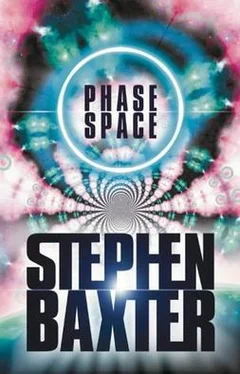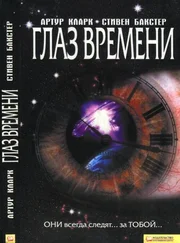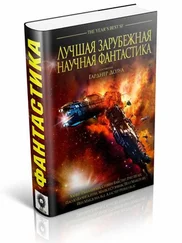It began, in fact, with a supernova: thus, from the beginning, it was a causal chain shaped by stupendous violence.
The star was a blue supergiant, twenty times the mass of Earth's sun, fifty thousand times as bright. It had formed a mere million years ago.
Nevertheless there was life here.
It had come drifting on the interstellar winds from older, more stable systems, and taken root on worlds which cautiously skirted the central fire.
But the hydrogen fuel in the star's fusing core was already exhausted.
The core, clogged with helium ash, began to burn that ash itself, helium nuclei fusing to carbon. And the carbon compacted to neon, the neon to oxygen… At last iron nuclei snowed, inert, on the centre of the star.
The core's free-fall implosion took fractions of a second. The star's outer layers were suddenly suspended over an effective vacuum. They collapsed inwards, the infalling layers crashing onto the rigid core remnant, and rebounded violently. The reflected shock wave was hurled out of the centre of the star, dragging away the star's outer layers with it…
For a week, the dying star outshone its Galaxy.
For forty years the expanding shell of matter travelled, preceded by a sleet of electromagnetic radiation: gamma rays, X rays, visible light. A human eye might have seen a brilliant blue-white star grow suddenly tremendously luminous, fifty times as bright as the Moon, as bright as all the other stars in the sky combined.
But Earth did not exist, nor even, yet, the sun. The garish light of the supernova washed, instead, over the thin tendrils of a gas cloud: cold, inert, stable.
And in any event no human telescope could have detected, rushing before the light storm, a single, delicate, spidery silhouette.
A fleeing craft.
Scale: Exp 1
In the confines of Ehricke's airlock Oliver Greenberg put on his gloves and snapped home the connecting rings. Then he lifted his helmet over his head.
The ritual of the suit checklist was oddly comforting. In fact, it was just the old Shuttle EVA routine he'd undergone a half-dozen times, in an orbiter-class airlock just like this.
But the Ehricke was no dinged-up old orbiter, and right now he was far from low Earth orbit.
He felt his heart hammer under his suit's layers.
Mike Weissman, on the hab-module's upper deck, was moni-toring him. 'EVI, you have a go for depress.'
Greenberg turned the depress switch on the control panel. 'Valve to zero.' He heard a distant hiss. 'Let's motor.' He twisted the handle of the outer airlock hatch and pushed.
Oliver Greenberg gazed out into space.
He moved out through the airlock's round hatchway. There was a handrail and two slide wires that ran the length of the curving hull, and Greenberg tethered himself to them. It was a routine he'd practised a hundred times in the sims at Houston, a dozen times in LEO. There was no reason why now should be any different.
No reason, except that the Earth wasn't where it should be.
In LEO, the Earth had been a bright floor beneath him all the time, as bright as a tropical sky. But out here, Earth was all of five million kilometres away, reduced to a blue button the size of a dime three or four arms-lengths away, and Greenberg was suspended in a huge three-hundred-sixty-degree planetarium just studded with stars, stars everywhere…
Everywhere, that is, except for one corner of the sky blocked by a vaguely elliptical shadow, sharp-edged, one rim picked out by the sun.
It was Ra-Shalom: Greenberg's destination.
He was looking along the length of the Ehricke's hab module.
It was a tight cylinder, just ten metres long and seven wide, home to four crew for this year-long jaunt. The outer hull was crammed with equipment, sensors and antennae clustered over powder-white and gold insulating blankets. At the back of the hab module he could see the bulging upper domes of the big cryogenic fuel tanks, and when he turned the other way there was the Earth-return module, an Apollo-sized capsule stuck sideways under the canopy of the big aerobrake.
The whole thing was just a collection of cylinders and boxes and canopies, thrown together as if at random, a ropy piece of shit.
But in a vessel such as this, Americans planned to sail to Mars.
Not Oliver Greenberg, though.
One small step time, he thought.
He pulled himself tentatively along the slide wire and made his way to the PMU station, on the starboard side of the hab module. The Personal Manoeuvring Unit was a big backpack shaped like the back and arms of an armchair, with foldout head- and leg-rests on a tubular frame. Greenberg ran a quick check of the PMU's systems. It was old Shuttle technology, cannibalized from the Manned Manoeuvring Units that had enabled crew to shoot around orbiter cargo bays. But today, it was being put to a use its designers never dreamed of.
He turned around, and backed into the PMU.
'Ehricke, EVI,' he said. 'Suit latches closed.'
'Copy that.'
He pulled the PMU's arms out around him and closed his gloved hands around the hand-controllers on the end of the arms. He unlatched the folded-up body frame. He rested his neck against the big padded rest, and settled his feet against the narrow footpads at the bottom of the frame, so he was braced. Today's EVA was just a test reconnaissance, but a full field expedition to Ra could last all of eight hours; the frame would help him keep his muscle movements down, and so reduce resource wastage.
Greenberg released his tethers. A little spring-loaded gadget gave him a shove in the back, gentle as a mother's encouraging pat, and he floated away from the bulkhead.
… Suddenly he didn't have hold of anything, and he was falling.
Oh, shit, he thought.
He had become an independent spacecraft. The spidery frame of the PMU occulted the dusting of stars around him.
He tested out his propulsion systems.
He grasped his right-hand controller, and pushed it left. There was a soft tone in his helmet as the thruster worked; he saw a faint sparkle of exhaust crystals, to his right. In response to the thrust, he tipped a little to the left. He had four big fuel tanks on his back, and twenty-four small reaction control-system nozzles. In fact he had two systems, a heavy-duty hot gas bipropellant system - kerosene and nitric acid - for the big orbital changes he would have to make to reach Ra, and a cold-gas nitrogen thruster for close control at the surface of the rock.
When he started moving, he just kept on going, until he stopped himself with another blip of his thrusters.
Greenberg tipped himself up so he was facing Ra-Shalom, with the Ehricke behind him.
'Ehricke, I'm preparing to head for Ra.'
'We copy, Oliver.'
He fired his kerosene thruster and felt a small, firm shove in the small of his back. Computer graphics started to scroll across the inside of his face plate, updating burn parameters. He was actually changing orbit here, and he would have to go through a full rendezvous procedure to reach Ra. That was what had gotten him this job, in fact. Greenberg had flown several of the missions which docked a Shuttle orbiter with the old Mir, and then with the Space Station. He had even been chief astronaut, for a while.
Then the VentureStar had outdated his piloting skills, and he was grounded, at age fifty.
NASA was full of younger guys now, preparing for the LMP, the Lunar-Mars Programme that was at the heart of NASA's current strategy, inspired by the evidence the sample-return probes had come up with of life on Mars.
This mission, a year-long jaunt to the near-Earth asteroid Ra-Shalom, was a shakedown test of the technologies that would be needed to get to Mars. Ra provided an intermediate goal, between lunar flights of a few weeks and the full Mars venture that would take years, setting major challenges in terms of life-support loop closure and systems reliability.
Читать дальше
Конец ознакомительного отрывка
Купить книгу








![Стивен Бакстер - Бесконечный Космос [litres]](/books/415680/stiven-bakster-beskonechnyj-kosmos-litres-thumb.webp)


